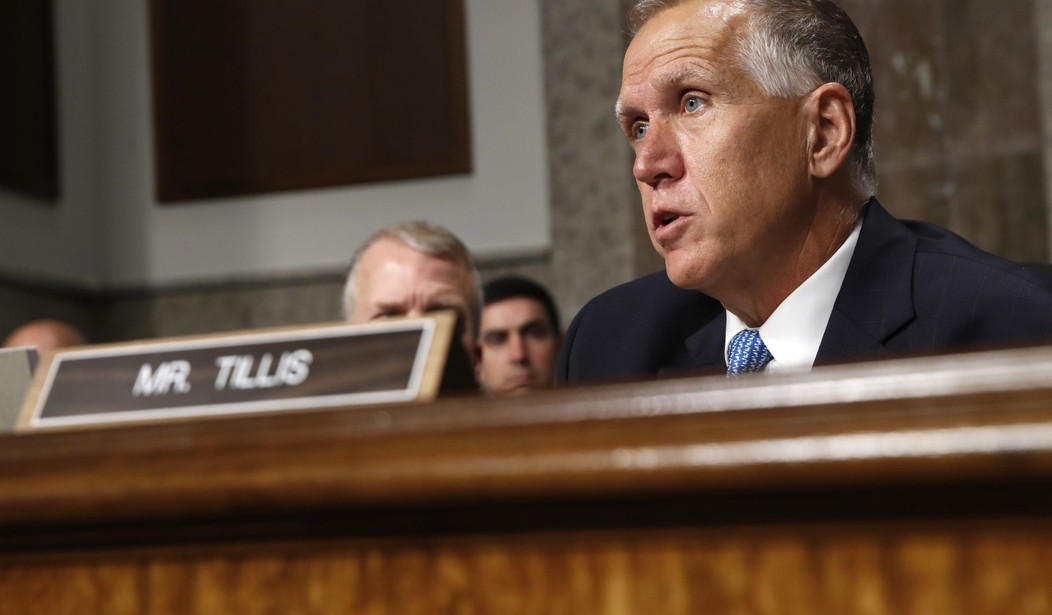Democrats in North Carolina are angling to replace Sen. Thom Tillis (R-N.C.), and the incumbent senator is not doing well in the polls. His Republican challenger, wealthy businessman Garland Tucker, is gaining on Tillis and may pose a formidable threat in the Republican primary.
“It’s recognized nationally that Tillis is one of the most vulnerable senators up for re-election. He’s just not voted in line with what he’s said he was going to do,” Tucker told PJ Media. The challenger said he is running on two major issues: immigration and cutting federal spending. He has faulted Tillis for failing to support President Donald Trump.
Indeed, Tillis is sinking in the polls. Last month, former state Sen. Cal Cunningham (D) led Tillis, 41 percent to 40 percent, according to Public Policy Polling. Only 23 percent of North Carolina voters said they approved of the senator’s job performance, with 46 percent saying they disapproved. A previous poll from Emerson College found Tillis trailing North Carolina state Sen. Erica Smith (D), 39 percent to 46 percent. These polls are premature and polling this far from the election is rarely accurate.
But Tucker’s campaign released the results of an internal poll showing Republican voters increasingly unhappy with the senator and willing to consider an alternative.
Before he ran for Senate, Tucker commissioned a poll of Republican primary voters. He found Tillis in a strong position, with 63 percent. Only 7 percent of GOP voters said they would back Tucker if he ran, and 30 percent said they were undecided. In a follow-up poll earlier this month, Tiller’s support had dropped to 40 percent, while Tucker’s rose to 30 percent, leaving another 30 percent still undecided.
The polls also asked Republicans whether they considered Tillis conservative. In the original poll, 47 percent called Tillis conservative (17 percent “very conservative” and 30 percent “somewhat conservative”) and 30 percent called him liberal/moderate. In the July poll, 47 percent called him liberal/moderate and only 35 percent considered him conservative (9 percent “very conservative” and 26 percent “somewhat conservative”).
Tucker faulted Tillis for being disloyal to Trump. The senator introduced legislation to protect special counsel Robert Mueller, opposed Trump’s plan to cut foreign aid, wrote an op-ed in The Washington Post condemning Trump’s decision to declare a national emergency to fund his border wall, before flip-flopping and supporting the measure.
Tucker also faulted Tillis for supporting a path to citizenship. On immigration, “border security is the first big part, the second part would be to make sure we never offer a path to citizenship to anybody that’s come in illegally, the third thing is we need a merit-based system for legal immigration. Tillis ran back in 2014 on a platform that said, ‘No amnesty.’ And as soon as he got to Washington, he proposed the Succeed Act, which had amnesty and a path to citizenship. He flip-flopped this spring about building the wall.”
Indeed, Tillis’ Succeed Act extends conditional permanent resident status to aliens who entered the U.S. as children. They can stay for five years if they came to the U.S. before age 16 and have lived in the U.S. continuously since June 5, 2012. The bill requires such aliens to get an education, prove good moral character, not have a criminal history, and pay appropriate taxes. Conditional permanent resident status can be extended for an additional five years, so long as the alien is not receiving federal benefits or has served in the military.
After 10 years, the bill would permit aliens to apply for lawful permanent residence, then naturalization and U.S. citizenship after five more years. While this “amnesty” and “path to citizenship” may seem appropriately stringent and long, the bill seems to violate the plain meaning of Tillis’ promises in the 2014 election.
Tucker’s second big issue is federal spending. “Again in 2014, Tillis ran on a very solid conservative platform of Cut, Cap, and Balance. He was going to cut spending, to live within the 2011 congressional spending caps, and balance the budget,” he told PJ Media.
While Tucker has some solid arguments against Tillis, Vice President Mike Pence has campaigned for the incumbent senator there. The National Republican Senatorial Committee (NRSC) has also supported Tillis. In fact, the NRSC has denounced the challenger as a wolf in sheep’s clothing — an opponent of Trump’s agenda.
“This primary is nothing more than an opponent of the president’s agenda with money to burn teaming up with a past-his-prime political consultant who is desperate to cash a paycheck,” NRSC spokeswoman Joanna Rodriguez told RealClearPolitics.
Yet Tucker is a strait-laced Tea Party man. He supported part of Trump’s agenda before Trump ran for president in 2016. In fact, he donated to the Tillis campaign in 2014. While he opposed Trump in the 2016 Republican primary — backing Gov. Scott Walker (R-Wisc.), then Sen. Marco Rubio (R-Fla.), then Sen. Ted Cruz (R-Texas) — he urged disaffected Republicans to vote for Trump in the general election. He told PJ Media he has been pleasantly surprised by the results, unlike in the case of Tillis.
“Voting for Trump was one of the best gambles I ever took in 2016, and unfortunately voting for Tillis in 2014 was not so good a gamble,” Tucker said.
“I was a Tillis supporter, supported him financially, and expected him to go to Washington as a conservative,” he explained. Yet to Tucker it seems Tillis got elected on a platform of “draining the swamp” but when he got to Washington, he realized “the swamp is a hot tub” and decided to “settle in.”
“Saying no to spending takes real backbone. It’s very, very hard for politicians to do that. My answer is that I’m not a politician and I can promise the voters I’m not going to have any trouble saying no to spending,” Tucker said. He committed to spending only one term in office if elected. “I won’t fundraise. I’ll go up and vote totally in line with the platform.”
The incumbent, on the other hand, “is very intent on being re-elected and he’s got this idea that you’ve got to swing to the center. I think in the process he’s made a lot of people mad on both sides.”
While Tillis has taken a few strong stances against Trump, he has voted in line with the president 95 percent of the time, according to a FiveThirtyEight analysis. Tucker agrees with Tillis on most major issues such as abortion, judicial confirmations, and tax cuts.
The challenger represents a purer Tea Party option, one more in line with Trump on the few issues where Tillis has decided to buck the president. The senator is vulnerable to Democrats, so the challenger may represent a stronger general election candidate.
Follow Tyler O’Neil, the author of this article, on Twitter at @Tyler2ONeil.









Join the conversation as a VIP Member